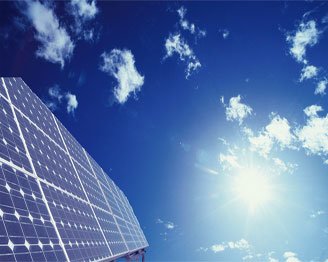Welcome to Green Innovation
green technology & eco friendly homes

Solar Panels
Another option open to eco minded home owners who are intent on micro generation are solar panels. Solar panels as they were
originally understood, are also known as Photovoltaic cells, and they are actually a kind of battery. Current flows when a p
from the panel when a light photon strikes the diode on the panel. These photovoltaic cells are not particularly cheap to
produce and the amount of energy they produce can be limited (especially on cloudy days or at night).
If you come across solar panels today, the term is just as likely to apply to "solar hot water" or "thermal panels". In
principle these solar panels are slightly lower tech than photovoltaic cells. They consist of pipes or tubes carrying a fluid
through a network that covers the surface of a (usually dark covered) highly conductive material. The idea is, that the
conductive material is heated by the suns rays and transfers its heat to the liquid in the tubes. That liquid is pumped
around the network, heating up as it goes, and is finally carried away to a hot water tank, or some kind of storage device.
These solar panels do not tend to provide electricity but instead provide supplementary hot water.
These solar hot water panels will more often than not work out to be the better option for the average homeowner, costing
less to manufacture and install, and having a greater impact on the average household's carbon footprint. Household names,
like B&Q offer solar panels at a cost of about £3000 installed, or £2000 uninstalled.
back to green innovation eco-friendly technology
© Copyright 2004-2024 - greeninnovation
Solar Panels
disclaimer | sitemap | links
